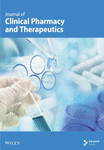PHARMACOKINETICS OF INTRAVENOUS CAFFEINE IN CRITICALLY ILL PATIENTS
Summary
The pharmacokinetics of intravenous caffeine used to measure liver function were evaluated in 20 critically ill patients. Each patient received a single dose of 3·0mg/kg of caffeine benzoate as a 30-min i.v. infusion. Caffeine serum concentrations were analysed by an enzyme-multiplied immunoassay technique (EMIT). Caffeine pharmacokinetics fitted an open one-compartment model. The mean value for the half-life (t1/2) was 9·46 × 4·32 h, the volume of distribution was 0·55 × 0·131/kg, and the plasma clearance (Cl) was 0·85 × 0·44 ml/min/kg.
The pharmacokinetics parameters of caffeine in critically ill patients compared with normal volunteers were characterized by a reduction in plasma clearance and prolongation in plasma half-life, whereas the volume of distribution remained unchanged.




